“SPLM is reunited and old structures will be maintained with President Kiir as the Chairperson for SPLM, Dr Riek Machar as the first Vice Chairman of the SPLM, Pagan Amum as the Secretary General and all cadres across the country who were expelled will be reinstated nationally. SPLM in Opposition and other groups including us G10 will cease from calling for the resignation of SPLM Chairman (H.E Salva Kiir). These are good for reconciliation because we all need the war to stop.” Madut Biar Yel speaking to Ajak Deng Chiengkou on SBS Dinka Radio
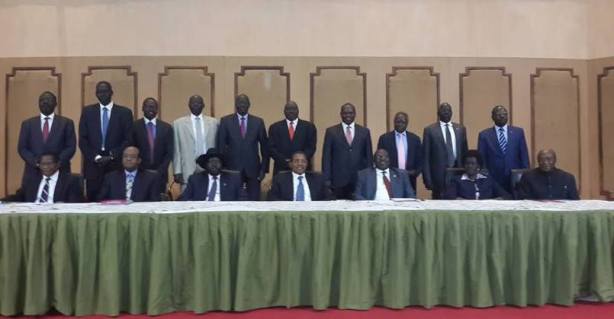
Signing ceremony of the Arusha Declaration, ink by Deng Alor (SPLM Leaders), Riek Machar (SPLM-IO) and President Kiir (Gov’t), and observe by Madam Nyandeng (SPLM Leaders) on the 21st of January, 2015 in Arusha, Tanzania
—
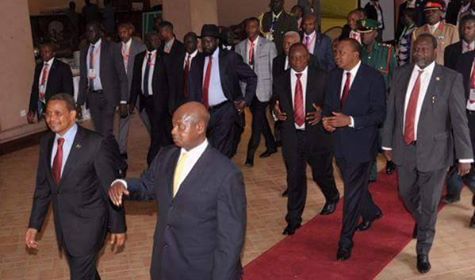
President Uhuru Kenyatta: We witnessed the signing of the SPLM Reunification Agreement between South Sudan President Salva Kiir, Dr. Riek Machar and Mr. Deng Alor Kuol which was overseen by Tanzania’s President Jakaya Kikwete in Arusha, Tanzania. The signing of the agreement will help the SPLM work together. The framework will reunite the party which many South Sudanese had placed their hopes on. Some of us have been involved in this particular process since the beginning of the crisis, and indeed it has been very agonizing at times to see leaders unable to talk to one another and yet they were the same leaders the people of South Sudan depended on to guide the young republic after struggling for many years. We hope that the instruments that have been signed here will form the basis of bringing about peace in South Sudan which is the hope of the South Sudan and the East Africa region as a whole.
—
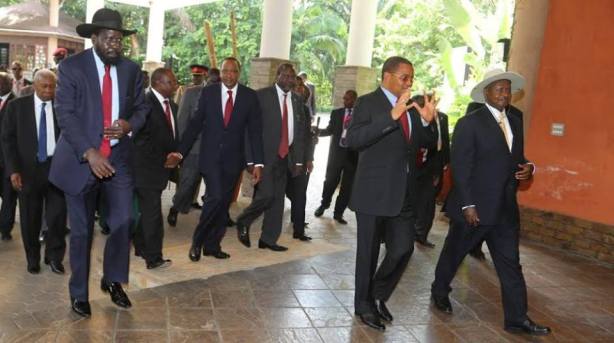
President Uhuru Kenyatta: We witnessed the signing of the SPLM Reunification Agreement between South Sudan President Salva Kiir, Dr. Riek Machar and Mr. Deng Alor Kuol which was overseen by Tanzania’s President Jakaya Kikwete in Arusha, Tanzania. The signing of the agreement will help the SPLM work together. The framework will reunite the party which many South Sudanese had placed their hopes on. Some of us have been involved in this particular process since the beginning of the crisis, and indeed it has been very agonizing at times to see leaders unable to talk to one another and yet they were the same leaders the people of South Sudan depended on to guide the young republic after struggling for many years. We hope that the instruments that have been signed here will form the basis of bringing about peace in South Sudan which is the hope of the South Sudan and the East Africa region as a whole.
—————-
SOUTH SUDAN LEADERS AGREE TO REUNIFY RULING PARTY
Published on Thursday, 22 January 2015 00:52
Crisis Management Initiative, Finnland
The leaders of the ruling party of South Sudan have agreed to reunify the Sudan People’s Liberation Movement (SPLM) during the Intra-Party Dialogue Process in Tanzania.
The three groups of the ruling party of South Sudan have agreed on major steps in order to reunify the Sudan People’s Liberation Movement (SPLM) during the Intra-SPLM Dialogue Process in Arusha, Tanzania. In a signing ceremony on 21 January, the leaders of the SPLM signed an agreement outlining the way forward for the re-unification of the party, including political, organisational and leadership issues. The parties have also settled on the principles and means of implementation.
The agreement was signed by Cde. Salva Kiir, President of the Republic of South Sudan; Cde. Riek Machar, Chairman of SPLM-In Opposition; and Cde. Deng Alor Kuol, Head of Delegation for Former Detainees. President of Tanzania Jakaya Mrisho Kikwete is the guarantor of the ceremony.
The signing ceremony concludes a new round of Intra-SPLM Dialogue process that has taken place between 8-21 January between SPLM in Government, SPLM in Opposition and SPLM Former Detainees. The meeting was organised by the Tanzanian government and its ruling party (CCM), and supported by CMI (Crisis Management Initiative).
The first round of the Dialogue Process took place on 12-20 October 2014. It led to the signing of the Framework Agreement for the principles, objectives and agenda for the process aimed at addressing the root causes of the internal crisis within the SPLM and the reunification of the party. A second round of the Dialogue was held between 22-24 December 2014.
South Sudan, the world’s youngest nation, descended into civil war in December 2013. The conflict has already caused immense human suffering. It is estimated that thousands have lost their lives and approximately 1.4 million people have had to leave their homes.
—
The draft agreement on the reunification of the SPLM in Arusha,Tanzania.
January 21, 2015
Table of Contents
- PREAMBLE 2
- ON POLITICAL ISSUES 4
III. ON ORGANIZATIONAL ISSUES 6
- ON LEADERSHIP ISSUES 7
- PENDING ISSUES 8
- WITNESSES AND GUARANTORS 10
VII. ANNEXES (TIME-TABLE, FRAMEWORK & COMMUNIQUES) 12
- PREAMBLE
The Intra-SPLM Dialogue took place in Arusha, Tanzania, and was attended by three SPLM groups from January 8th until January 19th under the auspices of Chama Cha Mapinduzi (CCM) chaired by the former Vice Chairman of CCM, Dr. John Samuel Malecela and facilitated by the CCM Secretary General, Mr. Abdulrahman Kinana.
The signing of the agreement took place today in Arusha. The following has been agreed to:
- ON POLITICAL ISSUES
1 Implement and comply with the provisions of the Cessation of Hostilities Agreement and use this Intra-SPLM Party Dialogue in Arusha, the report of the AU Commission of Inquiry on the Conflict in South Sudan and the IGAD mediation process in Addis Ababa to expedite the conclusion of the Peace Agreement in order to end the war.
2 SPLM Leadership shall make a public apology to the people of South Sudan for what has happened since December 15th 2013.
3 There shall be established new transitional structures of SPLM.
4 Develop and implement a comprehensive programme for national unity, peace, reconciliation, healing and promoting harmony amongst the People of South Sudan.
5 Commit all the three SPLM Groups to reunification and reconciliation of the SPLM Leadership and Membership.
6 Combating the culture of militarism and sectarianism in the political life and open up a space for achieving a political environment that promotes genuine political pluralism.
7 Embrace the values and culture of democracy, unity and development and commits to undertake and implement urgent comprehensive democratic reforms, reorganization and transformation of the Party.
8 Ensure that the SPLM redefines its ideological direction, developmental path, the nature of its democracy, system of governance and the nature of society it aspires to build.
9 The SPLM shall formulate and provide policies and programmes to be implemented by its Government with the aim of achieving a democratic developmental state.
10 Revocation of decisions for dismissal of party cadres from party membership and leadership positions resulting from the internal conflict within the party. (This because you are establishing new SPLM transitional structures actions prior to this are irrelevant).
11 The SPLM commits to redefine and implement its vision of state and nation building in order to achieve a peaceful, democratic, just and prosperous South Sudan of equality, freedom and respect for human rights and dignity.
12 Any individual SPLM member convicted by a competent court or tribunal of crimes against humanity, war crimes, crimes against peace or gross human rights violations and abuses during the crisis that erupted in the country since 15th December 2013 shall not be eligible to hold public office in the Party and the Government.
13 Ensure exclusion from participation in the SPLM structures of categories such as the armed forces and other organized forces and judicial personnel in accordance with their respective constitutive laws.
14 The SPLM shall uphold the principles of accountability, transparency and good governance and to combat corruption and malpractices in the Party and Government.
15 In order to ensure peace and security in the country and guarantee public safety, the SPLM calls for the implementation of comprehensive reforms, transformation and professionalization of all the security sector institutions and to ensure that their composition reflects national character.
16 SPLM commits to and supports the establishment of a comprehensive system of transitional justice, (the core elements of which are truth and reconciliation, criminal prosecution, reparations and institutional reforms), to look into the issues of atrocities, human rights violations and abuses in the country.
17 The SPLM shall develop mechanisms for resource mobilization and management to ensure transparency and accountability and to combat corruption. Undertake robust mobilization of resources and shall ensure transparent and prudent management of such resources as well as conducting annual independent audits.
18 (Moved to Pending issues)
19 In order to ensure that executive powers in Government are not negatively used to influence or determine Party matters, all decisions affecting the Party shall be taken only through the Party structures;
20 (Moved to Pending Issues)
III. ON ORGANIZATIONAL ISSUES
21 The SPLM General Secretariat shall be restructured and reorganized in order to streamline its offices and functions to ensure efficiency and effectiveness benefiting from experiences of sisterly organizations. In order to implement this, the SPLM leadership shall:
- Strengthen and streamline coordination between the General Secretariat and other levels’ secretariats .and provide oversight;
- Formulate procedures and guidelines for cadre identification, recruitment, orientation, training and deployment to be used at all levels of SPLM structures. to ensure commitment, competence and effective participation;
- Provide guidance guidelines to the SPLM caucuses in the Legislature and the Executive;
- Disseminate Party policies;
- Ensure formulation and implementation of Party disciplinary procedures and regulations;
1 All processes of holding Party congresses and the National Convention shall be suspended until the reunification and reconciliation of the Party is achieved and the war is ended, so that all members are able to participate effectively and freely.
An Extraordinary Convention may be convened for the sole purpose of passing the basic documents agreed by the SPLM Groups to facilitate its registration in accordance with the provisions of the Political Parties Act, 2012.
The composition of the membership of the Political Bureau (PB) shall be reviewed and expanded to comprise 35 members to reflect the equitable representation of the three SPLM Groups., equitable representation of the States, SPLM Women League, SPLM Youth League and SPLM Veterans League.
The PB shall be restructured in a manner that ensures timely decision making, internal cohesion and collective decision making.
A Working Committee of the PB consisting of the Chairperson, Deputies of the Chairperson, the Secretary General, and his/her Deputy (ies) and any other members of the PB to be selected by the PB shall be established to handle critical and urgent matters subject to subsequent approval by a meeting of the whole Political Bureau. (Such a committee was once established but became problematic and resulted into marginalization of PB)
The PB shall establish a Standing Committee to vet and scrutinize members of the Party vying for positions in the Party institutions and its decisions shall be subject to approval by the whole membership of the PB in official meetings. Each level should have its own committee guided general regulations approved by the party.
The Working Committee of the PB shall vet and scrutinize members of the Party vying for positions of leadership in the Government and its decisions shall be subject to approval by the whole membership of the PB in official meetings.
Establishment of SPLM Political School for Party cadres training and development.
IV. ON LEADERSHIP ISSUES
The PB shall develop a Party Leadership Code of Ethics and Disciplinary Procedures to be applicable and upheld by all members irrespective of their positions. Both documents shall be approved and adopted by the NLC.
The term limit for the SPLM National and State Chairpersons of the party shall be two terms of 5 years each only.
Any member of competence and good standing has the right to contest for any leadership position in the party at any level.
In order to consolidate democracy in the party, collective leadership decision-making in the Party structures shall be adhered to and enhanced.
The Leadership of the party at all levels shall be elected democratically in a transparent and fair manner.
A Standing Committee for national candidates’ selection shall be established by the PB based on competence and integrity, whose functions shall be to scrutinize and vet individual members presenting themselves for election to leadership positions at the Party and General Election. Decisions of the Committee shall be subject to appeal to the PB. The national committee selects candidates for National Chair and deputies only the rest is done at lower levels committees.
The Political Bureau (PB) shall establish a Standing Committee at State level Candidates’ Selection Committee, based on competence and integrity, to scrutinize and vet individual members presenting themselves for election to leadership positions at the state level. Decisions of State Candidates Selection Committee shall be subject to appeal to the PB.
The State Secretariat shall establish a Standing Committee at County, Payam and Boma levels, based on competence and integrity, to scrutinize and vet individual members presenting themselves for leadership positions at those levels; Decisions of County Candidates’ Standing Committee shall be subject to appeal to the State Secretariat.
The PB shall develop rules and procedures to be followed by the Standing Committees for candidates’ selection at national, states and county levels. The General Secretariat shall oversee provide support and follow up the work of the Standing Committees on candidates’ selection and report to the PB.
The PB shall formulate policy to institutionalize the care for elderly members of the Party upon their retirement.
The SPLM recognizes the need for the establishment of a transitional government in which the SPLM Groups and other political parties shall participate equitably in order to end the war and establish sustainable peace. The reunified SPLM shall abide by the terms and spirit of the IGAD Peace Agreement.
The Parties to this Agreement have requested and mandated the CCM Leadership to consult with the respective principals on the way forward with regard to the structure of the leadership of the reunified SPLM.
The PB shall establish a Tripartite Committee from the three SPLM Groups to oversee the implementation of this Agreement and the reforms stipulated herein.
Guarantors (further consultation needed)
- PENDING ISSUES
- The Nature of the Crisis and its Genesis (waiting for text from IO)
(moved from Preamble).
1 Accept that all culprits and all those who aided and abetted violations of human rights, including foreign troops must be held responsible and brought to book. (FROM POLITICAL ISSUES) (para 2)
An interim, re-unified and reconstituted NLC whose membership shall be established by the three SPLM Groups (by IO) (FROM ORGANIZATIONAL ISSUES)
Political Detainees and prisoners of conscience (by IO) (FROM Political Issues)
The SPLM takes full responsibility for the crisis in the country and resolved that any individual members of the SPLM who are found guilty for those atrocities or bear the greatest responsibility for those atrocities and human rights violations and abuses during the crisis shall be held accountable for those crimes and violations (REFERRED TO HEADS OF DELEGATIONS FROM POLITICAL ISSUES para 17)
- A) Suggestion from (IO):
It is agreed that the National Convention shall adopt a new democratic constitution for the SPLM. The new constitution shall provide among other measures, the adoption of mode of voting by secret ballot and/or consensus. Further the SPLM shall abolish all provisions allowing the SPLM Chairpersons of appointing to the National Convention, Congresses, National Liberation Council (NLC) and PB. The new constitution shall formulate policies and guidelines for the representation of minorities and disadvantaged groups in the National Convention, the NLC and all other structures. This constitution shall be an interim constitution.
- B) AGREED Ad Ref
It is agreed that the National Liberation Council (NLC) shall revisit and review the contentious provisions, in the draft SPLM constitution to ensure internal democracy within the Party structures, before its presentation to the National Convention. These issues include, but not limited to the following:
- Mode of voting: whether by show of hands or secret ballot, it is agreed that the procedure of Voting in SPLM meetings at all levels shall be by secret ballot if no consensus is achieved; and by show of hands on non-controversial issues.
- The provision allowing the SPLM Chairpersons at all levels to nominate five percent (5%) of the membership of the congresses and the National Convention: The following are proposed:
- Abolition of the provision on the 5% appointments by chairpersons to the National Convention, congresses and liberation councils at all levels;
- Political Bureau to formulate policy and guidelines for the representation of minorities or disadvantaged groups in the Convention, Congresses and Liberation Councils.
- The size of the National Convention: It is proposed that the total number of delegates to the Convention be reviewed.
- Nomination of Party leaders by The Chairperson: Regarding the process of election or selection of Party leaders at all levels, it is agreed that:
- The National Convention shall directly elect the Chairperson of the SPLM and his/her Deputies and members of the National Liberation Council by direct and secret ballot.
- The National Liberation Council shall elect the Political Bureau and the Secretary General and his/her Deputies through direct and secret ballot.
iii. The Political Bureau shall formulate regulations governing procedures for the election and selection of candidates for the position of Chairperson of the SPLM and his deputies, members of the NLC, members of the Political Bureau, Secretary General and his/her Deputy(ies), State and County Chairpersons, Payam and Boma Chairpersons
(REFERRED TO HEADS OF DELEGATIONS FROM POLITICAL ISSUES para 17)
- WITNESSES AND GUARANTORS
Signatories:
Cde. Daniel Awet Akot
Cde. Taban Deng Gai
Cde. Deng Alor Kuol
Guaranteed by:
Cde. Abdulrahman Kinana,
On behalf of Chama Cha Mapinduzi
Witnessed by:
Cde. John Samuel Malecela
Done at Arusha, Tanzania
On the 19th of January 2015
VII. ANNEXES (TIME-TABLE, FRAMEWORK & COMMUNIQUES)




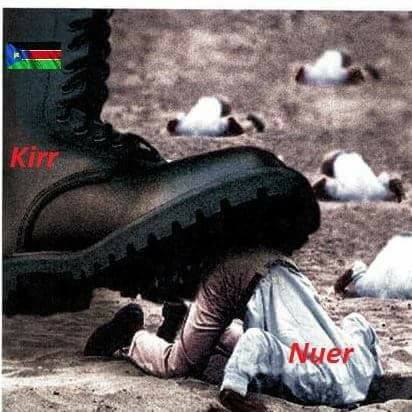
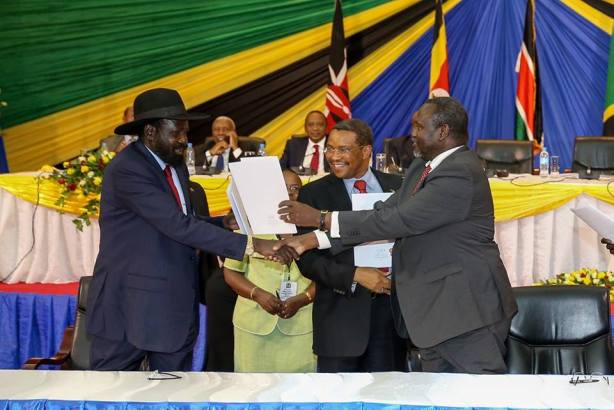
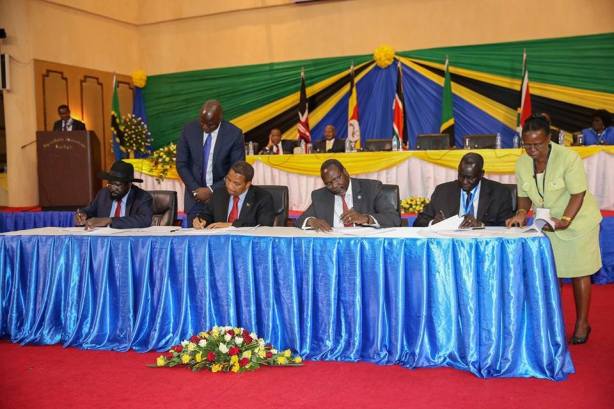
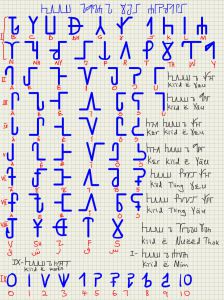
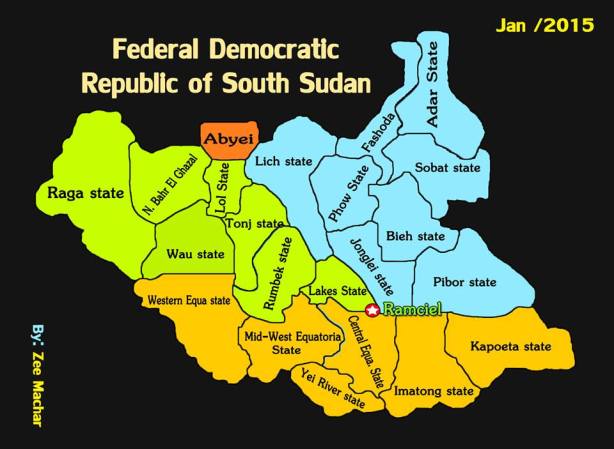
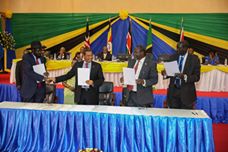
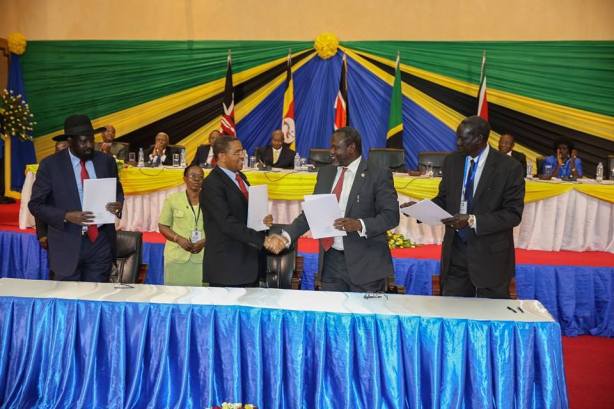



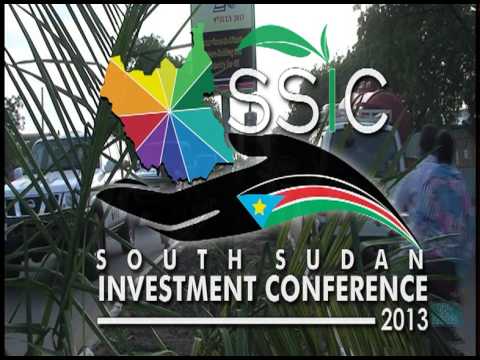
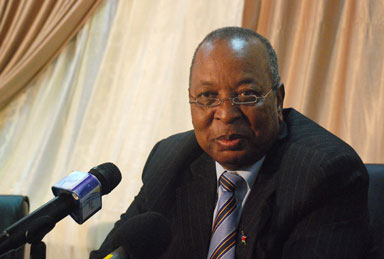
THE MANIC BEHAVIOURS OF RIEK MACHAR TOWARDS THE PEOPLE OF SOUTH SUDAN
Posted: January 25, 2015 by PaanLuel Wël Media Ltd. in Commentary, Contributing Writers, Featured ArticlesBy Deng Bul Riak
Riek Machar and his wife, Angelina Jany Teny, in Khartoum with President Omar Bashir
January 25, 2015 (SSB) — I am wondering whether rebels will honor the peace agreement that was signed last week in Arusha Tanzania on the reunification of the SPLM warring factions or not?It seems the peace is going to be dishonored like Addis Ababa peace agreement in 1972 that was dishonor by Khartoum government.
Yesterday I went to Sudan tribune website and I read the article titled ‘President Kiir must step down’ and when you through Arusha peace agreement, you may seen the processes were to reunited the SPLM warring factions and restated of old structures of the party that is Kiir will remained as the chairman of the party, Riek will be 1st vice chairman and Pagan as Secretary general of the party respectively and it was agreed by both parties.
As far now I don’t know the reasons why rebels are still insisted on the calls for the President to step down? Is it because the entire rebel groups were not told about what Riek sign in Arusha? I think this calls is a premature and unacceptable if the rebels mind about peace.
It seemed the rebels are contradicted themselves and in particular Riek who sign the peace in deal in Arusha, Tanzania and he allowed his groups to continued giving pressure on government side.
In my own understanding I believed the calls for President Kiir to step down, would dragged us back to square one, accelerated tensions in the country and our civil population would continues with unstoppable suffering in the country but when the peace was signed in Arusha,the vulnerable people of South Sudan and the world as a whole were very optimistic for peace to yearning to the country.
In my conclusion I urge rebels faction let us all be patriotic to our country and not have a mindset to destroyed it this country belongs to all of us.We fought for her, we suffered from her and eventually we vote for her for our independent.Let’s not forget our extremely struggle for this nation.
To rebel leader Riek Machar I know you are hungry for power but let me tell you that the way you love to be in power that’s how the citizens of South Sudan love peace.
Once again, advised your groups to accept peace and let’s rebuilt love, trust and confident in our hearts.
The written is a peace loving and you reach him through his E-mail: dengbul81@yahoo.com
–
The opinion expressed here is solely the view of the writer. The veracity of any claim made are the responsibility of the author, not PaanLuel Wël: South Sudanese Bloggers (SSB) website. If you want to submit an opinion article or news analysis, please email it to paanluel2011@gmail.com. SSB do reserve the right to edit material before publication. Please include your full name, email address and the country you are writing from.
Share this: